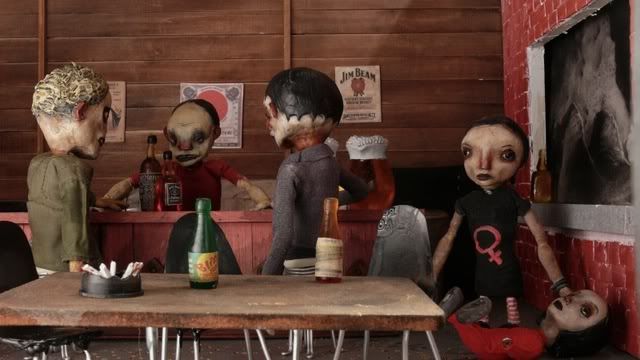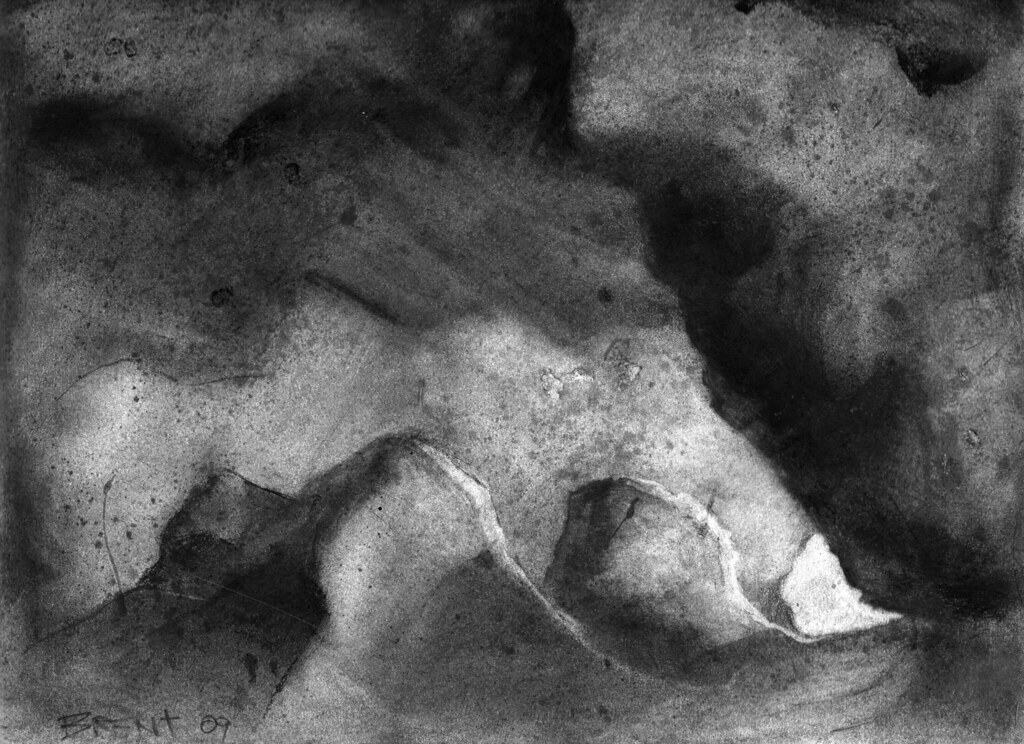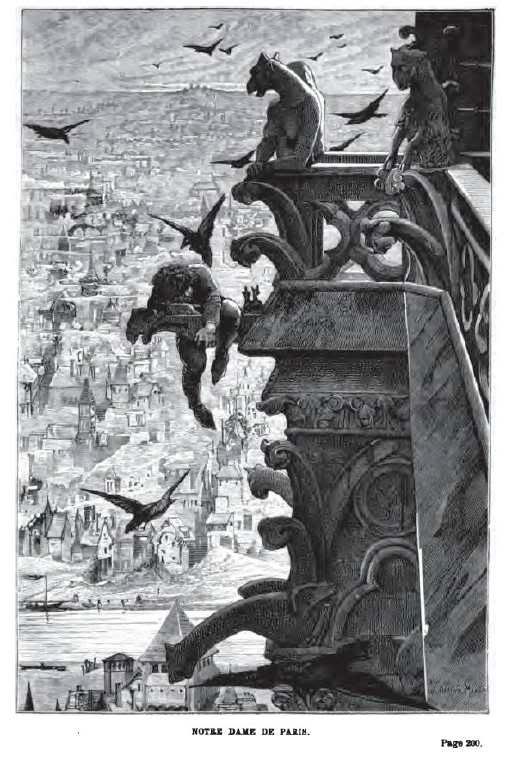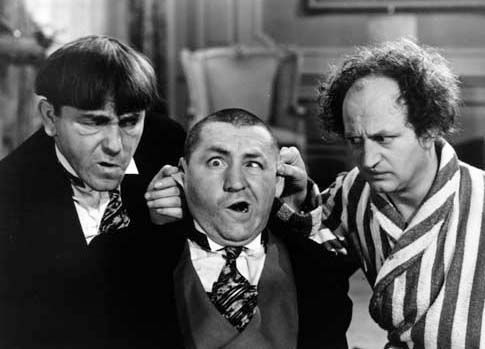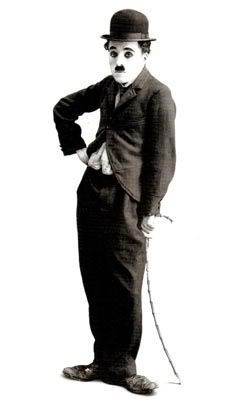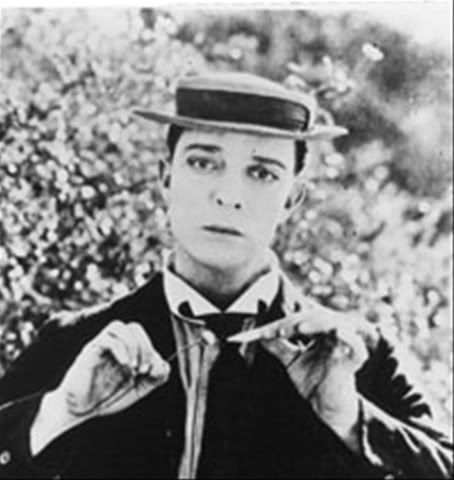
"A real film maker, when formulating a new project, will start out with a series of conceptual messages and ideas that he/she wishes to communicate to an audience. These will be fleshed out into a fictional storyline scenario and, layer by layer, a workable script and aesthetic / technical style will be developed in accordance with those concepts. That is the artist’s approach to film.
Modern film making in Britain and America, even at the level of short film making, almost universally starts with the desire to make money … NOT ART!"
This quote comes from an essay written by Rob Ager called
The great disaster of modern British/ American film. I discovered Rob's excellent website in a rather roundabout way recently... essentially because just before Halloween I happened to catch Stanley Kubrick's The Shining on cable TV, which reignited my interest in the movie and in Kubrick's films in general. I suddenly realized that, in spite of my tendency toward study and analysis I had never looked at an analysis of any of Kubrick's films. Well, this was a colossal oversight that needed to be remedied immediately! So a little Googling landed me on his website;
CollativeLearning.com, where he has analyses of a lot of great films including all of Kubrick's important ones. I also discovered very cogent and insightful analyses of some of my other favorites like Alien, Bladerunner, The Exorcist, and the best and most comprehensive and clear-headed analysis I've ever found on David Lynch's enigmatic Mulholland Drive - a film that's led me on a merry chase through a lot of online analyses, some of which I felt came close to the mark but all of which left big holes. Ager has filled in almost all of the holes!
The unfortunate part of this is that, since discovering Ager's incredible site, I haven't done anything on my film. But now I've waded through almost all of his articles and soon will be free of this obsession... at least until the next one pops up.
I most highly recommend reading these analyses for anyone interested in being a filmmaker of any sort, or even just to anyone who loves movies and wants to maximize their enjoyment of them. Let me begin by defining just what a film analysis is, and how it differs from a film
review or film
criticism.
A film review... also sometimes referred to as film criticism, is done by a film critic... someone like Roger Ebert of any of his cohorts throughout the years on his various shows. Essentially it's just a brief synopsis of whether a movie is good or not according to that reviewer's or critic's system of judgement. Usually a reviewer or critic will watch a movie twice or sometimes 3 or more times... the first time they just watch as anyone would, just to absorb the experience the movie provides. Then they'll jot down some notes and start watching it again, this time dissecting as they go and taking notes as they watch. Generally twice is enough, then they assemble their notes and tidy them up for publication. What they're basically interested in is whether the movie is enjoyable and how it stacks up against the standards in its genre.
But film analysis on the other hand is much more comprehensive and less judgmental. An analyst isn't concerned with telling a general audience what to go see this weekend -- instead an analyst is an investigator... delving deep into a film to extract what the filmmaker might have buried in it. Most films don't stand up to analysis of this sort... most Hollywood movies are simply formulaic clones (as suggested in the quote above) with little or no substance under the flashy exterior. But some directors do approach the craft of filmmaking as an art... for instance Kubrick, Lynch, and several others. Their films are made with great attention to detail and they take great care in creating meaning. Often there's a hidden subtext or even several of them. Identifying and decoding these subtexts takes time and effort and a lot of thinking. Usually a film won't be analyzed when it's first released.... it takes time to determine whether a given film might have anything under the surface worthy of the demanding process of analysis. So it's often older films which have shown themselves to have some substance beneath the surface that are candidates for this treatment.
A film analyst will begin like a critic... the first time they watch a film they're just watching it, like any audience member. But their keen moviegoing eye will notice subtle clues to the presence of hidden depth. Strange things characters might say, or weird occurrences... maybe a sign that's shown with strange wording on it. Especially important are things that are repeated. Visuals or sounds or statements... these are called motifs when they're repeated, and such repetition usually means the director put them there on purpose. Or that he just wasn't paying attention, which usually isn't the case with a director the caliber of Kubrick.
So... with the clues noted, an analyst will then watch the movie many times, and might watch certain parts of it over and over... using freeze frame and slow motion. Now certain things are more evident thanks to Blu-Ray and its greater visual clarity over regular DVDs... things can be seen much more clearly, and sometimes a particular release will have a better sound track that allows things to be heard more clearly than in other versions. Other things an analyst will pay attention to are the director's other films, anything that's known about the director such as any personal obsessions or interests he might have, news items about him, his biography... on and on. Sometimes clues can be found in advertising for the film, or in earlier versions of the screenplay or the book on which it was based.
Wow... I'm really whaffling on, aren't I? I didn't mean to go on for so long about this. My point in explaining what film analysis is all about was to educate my more 'general audience' readers about the level of depth and complexity that often exists without most people suspecting it in certain films. Most of us are only aware of the surface story in movies... and in most movies that's all there is. But in films by the likes of Kubrick or Lynch there's a lot more, and to me it's very gratifying to puzzle it out. One reason I love this process is because it gives a movie a vastly longer 'shelf life'... you can keep coming back and watching it and gain new insight into it for many years. Most decent movies are only good for 2 or 3 viewings and that's it, and even then they don't reveal anything new after the first viewing (unless you missed something). But to experience a Kubrick film with the help of good analysis like Rob Ager provides is to peel away layer after layer and reveal levels of meaning you never suspected were there... it's literally like an excavation... think of a movie as a building, and most anywhere you dig there's nothing but dirt underneath... but Kubrick builds over sites that are rich in subsurface detail. Quite literally in the case of The Shining.. the Overlook Hotel was built on top of a Native American burial ground (and so was the hidden narrative... quite to my surprise!)
Take for example The Shining. I hadn't seen it since shortly after the movie came out in 1980. Even then, much younger and uneducated about filmmaking, I was aware that something weird was going on in that movie that I wasn't understanding. Everyone was... and that's why even though the surface story itself is pretty messed up, it's always been considered one of the masterpieces of cinema. If you watch the movie, there's some really awful acting, and from great actors like Jack Nicholson and Shelley Duvall! Really hammy amateurish stuff... which is even weirder when you take into account the known fact of Kubrick's perfectionism and the fact that he'd often demand as many as 140 takes on even simple shots!!
Well I won't write any more. I could easily go on and on... but I'll just leave it at that. Anyone whose interest has been piqued by this blog entry please visit Rob's incredible site and read some of the analyses. Rent the films in question and watch them, with his findings in mind, and see if it doesn't enhance the experience. For me it most definitely does, though I know some people prefer to just see a movie as entertainment and leave it at that.
Ager has more on his site than just film analyses... the quote at the top of this entry actually comes from an article he wrote.
Here's a page from his site collecting several of his articles, and I've enjoyed almost every one.
Happy reading!
